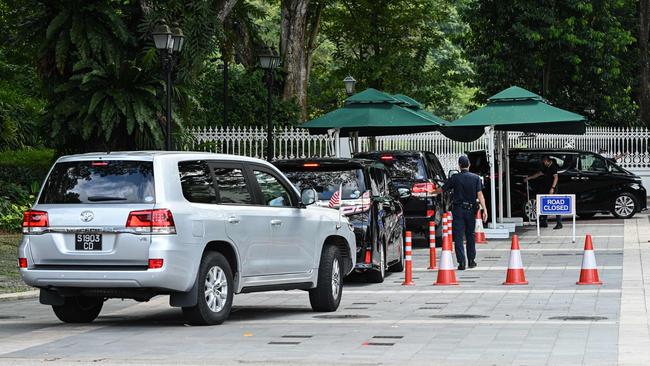Nancy Pelosi’s Asia tour kicks off under Taiwan cloud
The trip by the speaker has been shrouded in secrecy following an escalation in tensions with China over Taiwan.

US House of Representative Speaker Nancy Pelosi on Monday kicked off an Asia tour that has been shrouded in secrecy following an escalation in tensions with China over Taiwan.
With no word if Ms Pelosi will visit the island, she stopped first in Singapore, where Prime Minister Lee Hsien Loong urged her at a meeting to strive for “stable” ties with Beijing. Her itinerary also includes Malaysia, South Korea and Japan, but a possible Taiwan visit has dominated attention in the run-up.
Reports about a plan to visit the island have enraged Beijing and caused unease in the White House with President Joe Biden trying to lower the temperature.
Beijing considers self-ruled Taiwan its territory and said it would regard a visit by Ms Pelosi as a major provocation.
Ms Pelosi’s office finally confirmed her Asia trip in a statement on Sunday once her plane was in the air, following days of speculation and the Speaker refusing to confirm her itinerary.
The statement did not mention Taiwan. But visits by US figures to Taiwan are usually kept secret until delegations land because of sensitivities with Beijing.
The Global Times, China’s state-run tabloid, suggested that Ms Pelosi might use “emergency excuses like an aircraft fault or refuelling” to land at a Taiwanese airport. “If she dares to stop in Taiwan, it will be the moment to ignite the powder keg of the situation in the Taiwan Straits,” tweeted Hu Xijin, a former Global Times editor.
Beijing’s foreign ministry on Monday warned a visit would “seriously threaten the peace and stability” of the Taiwan Strait if it goes ahead. “If House Speaker Nancy Pelosi visits Taiwan, China will take resolute and strong countermeasures to defend its sovereignty and territorial integrity, ”spokesman Zhao Lijian said. “As to what measures, if she dares to go, then let’s wait and see.”
Ms Pelosi is accompanied by house foreign affairs committee chairman Gregory Meeks, as well as members of the house committees on intelligence and armed services.
Taiwan’s 23 million people have long lived with the possibility of an invasion but that threat has intensified under Chinese President Xi Jinping.
The US maintains a policy of “strategic ambiguity” over whether it would intervene militarily were China to invade. While it diplomatically recognises Beijing over Taipei, it also backs Taiwan’s democratic government and opposes any forced change to the island’s status.
US officials often make discreet visits to Taiwan to show support but a Pelosi trip would be highest profile since Republican speaker Newt Gingrich in 1997.
Mr Biden and Mr Xi had a tense phone call last week that was clouded by disagreements over Taiwan. Mr Xi issued an oblique warning to the US not to “play with fire” over the island.
The feverish speculation about Ms Pelosi’s Taiwan plans has coincided with a rise in military activity across the region, highlighting the combustibility of the issue. US officials have sought to play down the significance of a Pelosi visit, urging calm from Chinese leaders.
Kharis Templeman, a Taiwan expert at the Hoover Institution, said Beijing “misread US politics and screwed their signalling up” with its intense reaction.
“They picked the wrong target. Biden doesn’t control the Speaker or any other member of congress,” he tweeted on Sunday.
“They’ve drawn the line at the Speaker of the house, on a visit rich in symbolism but of limited practical value. And now it will be politically costly for either Pelosi not to go, or Xi not to respond with something dramatic.”
In Taiwan, there have been mixed views about the prospect of Ms Pelosi visiting, but figures from both the ruling party and the main opposition have said the island should not cave to Chinese pressure. “If Pelosi were to cancel or postpone the trip, it would be a victory for the Chinese government and for Xi as it would show that the pressure it has exerted has achieved some desired effects,” Hung Chin-fu, from Taiwan’s National’s Cheng Kung University, said.
AFP



To join the conversation, please log in. Don't have an account? Register
Join the conversation, you are commenting as Logout